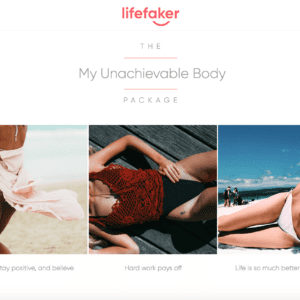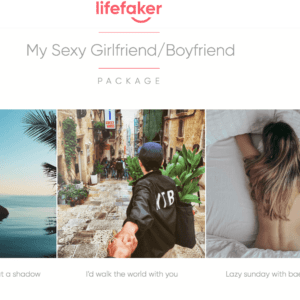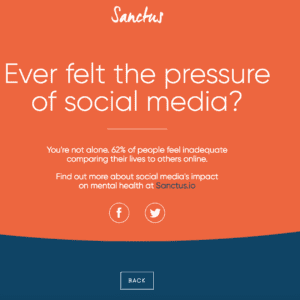It allows people to share their life’s brightest moments– a perpetual celebration of the things and people they love most: their passions, interests and experiences. What could be wrong with that?
Well, here’s the catch:
with 700 million users worldwide, the influence of Instagram is boundless — and young women are particularly susceptible. Scrolling through is an easy way to pass time, but it’s likewise an easy way to slide into a sense of false reality and hopelessness.
Studies have shown the negative mental health impacts of social media (particularly Instagram) as users, women and men compare their lives to ones that appear far more golden than their own. Ones where smiling faces (perfect teeth of course) sit atop tanned, toned, barely-there bodies. Where holidays are endless, relationships thrive and careers prosper.
A world that isn’t, in any sense, a true reflection of real life.
So, mental health organisation, ‘Sanctus’ decided to create a campaign that would turn this on its head. This week, thousands logged onto Lifefaker.com – a site which purported to be selling photos to individuals keen to fake a “perfect Instagram life”.
The photos ranged from ‘the unachievable body package’, to the ‘I can be arty and deep’ montage. There were also image sets of ideal holidays, and a ‘sexy girlfriend/boyfriend’ collection. Weird, but strangely appealing.


“Ever felt the pressure of social media? You’re not alone. 62% of people feel inadequate comparing their lives to others online,” it read. The advertisement then urged users to look into the impacts social media has on mental health at Sanctus.io”
Over 100,000 people logged onto the site over three days – enough to crash the server – but the team at Sanctus claim this is only the beginning of their campaign to shake people out of their social media anxiety.
In the past week, Sanctus have had more people reach out to them about mental health than ever before with a 1,080% increase in site hits, a 667% increase in engagement on Twitter and a 1646% increase in Facebook reach.
In just a week, Sanctus proved the magnitude of a problem often dismissed in social circles. The truth is this: social media connects us and isolates us, all at the same time. We need to be aware of this, and prepared to call our “Insta life” quits if it all gets too much.



